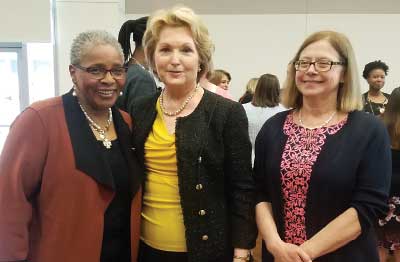Mental health is essential to a child’s healthy development. That was the message highlighted this year by the Substance Abuse and Mental Health Services Administration (SAMHSA) during National Children’s Mental Health Awareness Day last month.
To mark the day, SAMHSA hosted a special event at George Washington University in Washington, D.C., under the theme “Partnering for Health and Hope Following Trauma.” The event brought together governors’ spouses, senior federal officials, and organization executives representing the fields of primary care, behavioral health, and child welfare, including APA and the APA Foundation, for an interactive town hall. The event also featured trauma survivors, youth who had experienced mental illness, and their family members.
NBC4 Washington anchor Aaron Gilchrist emceed the event. Panel experts fielded questions from audience members and webcast viewers.
Elinore McCance-Katz, M.D., the assistant secretary of mental health and substance use at the Department of Health and Human Services and head of SAMHSA, introduced the first panel discussion on the importance of using a trauma-informed approach.
“Young people who have experienced trauma are more likely to develop mental health conditions such as anxiety, depression, and substance use disorders, McCance-Katz said. “We also know that trauma increases the probability that young people will develop physical problems like cardiovascular diseases later in life.” Trauma, she said, includes adverse childhood experiences such as sexual, physical, and other kinds of abuse.
A new report by SAMHSA indicates that 82 percent of children receiving community-based mental health services have had traumatic experiences. After receiving services through SAMHSA’s Children’s Mental Health Initiative (CMHI), which addresses the needs of children, youth, and young adults with serious emotional disturbance, suicidal thoughts among those who experienced trauma decreased by 68 percent, and suicide attempts decreased by 78 percent. In addition, the number of arrests declined while school attendance and performance improved.
“Evidence-based, trauma-informed care models such as those supported by SAMHSA are effective in improving outcomes for children and youth,” McCance-Katz said.
According to SAMHSA guidelines, trauma-informed care shifts the focus from “What’s wrong with you?” to “What happened to you?” by understanding the widespread impact of trauma and potential paths for recovery; recognizing the signs and symptoms of trauma; integrating knowledge about trauma into policies, procedures, and practices; and seeking to resist re-traumatization.
Educators, psychiatrists and other physicians, psychologists, law enforcement officials, and social workers need “to recognize and respond appropriately to the impact of traumatic stress on children and their families,” McCance-Katz said.
Incoming APA President Altha Stewart, M.D., said once a clinician knows what a child has gone through, it is easier to “establish a foundation for treatment.”
Panelist and sexual violence survivor Amber Singh emphasized that medical professionals must “create an environment where a child can feel validated.”
“The first few people that a child talks to about their experience with trauma are going to have a lasting impact on that child’s ability to recover from what happened to them,” she said.
As the event concluded, U.S. Secretary of Health and Human Services Alex Azar presented SAMHSA Special Recognition Awards to 18 governors’ spouses and Jacqueline Pata, executive director of the National Congress of American Indians, for supporting CMHI and trauma-informed care in their states. The award winners had served as honorary chairs for the event.
That same day, more than 1,100 communities across the country held their own events to bring attention to children’s mental health, SAMHSA reported.
“For anyone who is struggling with mental illness—or has a family member who is—remember that there is hope and that help is available,” McCance-Katz said. ■


